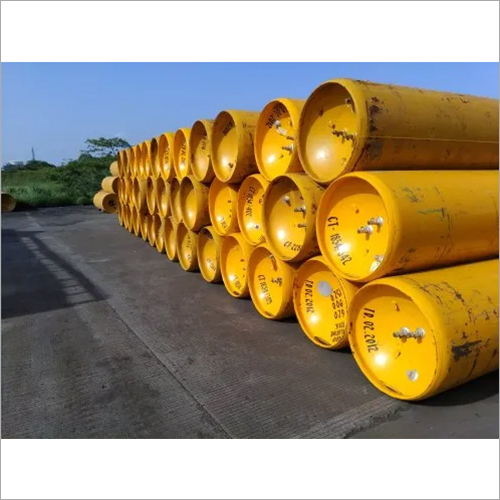
Chlorine Gas Cylinder
Product Details:
X
Chlorine Gas Cylinder Price and Quantity
- 20 Ton
Product Description
Chlorine Gas Cylinder is a sturdy and easy to transport gas filled container that is commonly used in wide range of commercial as well as industrial applications. This compressed gas filled cylindrical container is highly demanding within various industries such as chemical manufacturing, metal processing, water treatment, and many more. The gas is toxic in nature that can cause severe health effects when exposed to skin and eyes. It should be stored in a cool, dry, well-ventilated area away from other chemicals and flammable materials. Get this product as per your requirements with an assurance of fast and safe delivery.
Uses of Chlorine Gas Cylinder:
1. Water Treatment: Chlorine gas is used to disinfect and purify water in municipal water treatment plants, swimming pools, and other water systems. It effectively kills bacteria, viruses, and other harmful microorganisms to make water safe for consumption and recreational use.
2. Bleaching and Paper Production: Chlorine gas is employed in the bleaching process for paper and pulp production. It helps remove color and impurities from wood fibers, producing white or lighter-colored paper products.
3. Chemical Manufacturing: Chlorine gas is used as a raw material in the production of various chemicals, including chlorinated solvents, plastics (like PVC), and organic compounds used in pharmaceuticals, agrochemicals, and other industries.
4. Textile Industry: Chlorine gas is utilized in the textile industry for bleaching fabrics and removing stains.
5. Disinfection in Food Industry: Chlorine gas is sometimes used for disinfecting food processing equipment and surfaces to maintain hygiene and prevent bacterial contamination.
6. Disinfection in Healthcare: In the past, chlorine gas has been used for disinfection in healthcare facilities, particularly for controlling the spread of infectious diseases. However, alternative disinfection methods like liquid chlorine compounds are now more commonly used due to safety concerns.
7. Wastewater Treatment: Chlorine gas is employed in the disinfection of wastewater before it is released back into the environment. It helps eliminate harmful pathogens and contaminants.
8. Chemical Synthesis: Chlorine gas can be used in various chemical synthesis reactions to produce compounds used in different industries.
FAQ:
Q. What is a chlorine gas cylinder?
Ans: A chlorine gas cylinder is a pressurized container that holds chlorine gas in its gaseous state. It is commonly used in various industrial applications, such as water treatment and chemical manufacturing.
Q. What is chlorine gas used for?
Ans: Chlorine gas is used primarily for water treatment, disinfection, bleaching, and chemical manufacturing. It's commonly employed to kill microorganisms in water, bleach paper products, and produce various chemicals and plastics.
Q. Is chlorine gas dangerous?
Ans: Yes, chlorine gas is hazardous and can be harmful to human health if inhaled or if there is skin contact. It is important to handle chlorine gas with extreme care and follow safety guidelines to prevent accidents and exposure.
Q. How is chlorine gas handled safely?
Ans: Chlorine gas should be handled by trained professionals who are familiar with proper safety protocols. This includes using protective equipment, working in well-ventilated areas, and having emergency response plans in place.
Q. What are the risks associated with chlorine gas exposure?
Ans: Chlorine gas exposure can lead to irritation of the eyes, skin, and respiratory tract. High concentrations can cause severe respiratory distress, difficulty breathing, and even fatalities in extreme cases.
Q. Are there alternatives to using chlorine gas for disinfection?
Ans: Yes, there are alternatives such as sodium hypochlorite (liquid bleach) and other chlorine-containing compounds that are safer to handle while still being effective for disinfection.
Q. Can chlorine gas cylinders leak?
Ans: Yes, chlorine gas cylinders can potentially leak if they are not properly maintained or handled. Regular inspection, proper storage, and adherence to safety guidelines are crucial to prevent leaks.
Q. How are chlorine gas cylinders stored?
Ans: Chlorine gas cylinders should be stored in a cool, dry, well-ventilated area away from direct sunlight, heat sources, and flammable materials. They should be kept secured and upright to prevent tipping.
Q. What should I do in case of a chlorine gas leak?
Ans: In case of a chlorine gas leak, evacuate the area immediately and notify emergency services. If trained to do so, follow the appropriate emergency response procedures, which may include sealing off the area and wearing protective equipment.
Q. Who is qualified to handle chlorine gas cylinders?
Ans: Handling chlorine gas cylinders should only be done by trained professionals who have the necessary knowledge of safety procedures and emergency protocols.
Q. Can chlorine gas cylinders be transported?
Ans: Chlorine gas cylinders can be transported, but strict regulations and guidelines must be followed to ensure safe transportation. This includes securing the cylinders and using specialized vehicles designed for hazardous materials.
Q. Are there regulations governing the use of chlorine gas cylinders?
Ans: Yes, the use of chlorine gas cylinders is regulated by various governmental agencies and organizations to ensure the safety of workers, the public, and the environment. Compliance with these regulations is essential.
Enter Buying Requirement Details
 |
Chemtrade International Corporation
All Rights Reserved.(Terms of Use) Developed and Managed by Infocom Network Private Limited. |

 English
English Spanish
Spanish French
French German
German Italian
Italian Chinese (Simplified)
Chinese (Simplified) Japanese
Japanese Korean
Korean Arabic
Arabic Portuguese
Portuguese